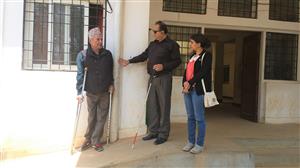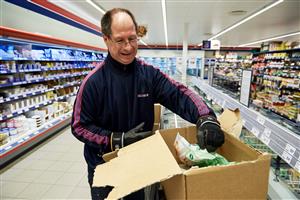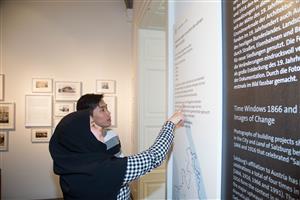Search Results
Search
Filter results
Advanced Filters
Your search returned 883 Solutions
-
Placing teachers with disabilities in regular schools
The programme places teachers with disabilities in regular schools, supported by assistant teachers. While the focus was initially on visually impaired people, the initiative has now been extended and reaches out to persons with other disabilities as well. Between 2014 and 2016 more than 34 jobs were created.
Lesothian Ministry of Education and Training, Lesotho -
Equal employment conditions
The Act revokes discriminatory provisions, under which operators of sheltered workshops were given a blanket exemption from minimum wage and holiday and sick leave legislation. Now all persons, including employees with disabilities of sheltered workshops, are entitled to the minimum wage, and holiday and sick leave benefits.
IHC - In Your Community New Zealand, Equal employment conditions, New Zealand -
The Mission of Artesens from France: Learning about art while touching tactile reproductions and experiencing moments of emotion and aesthetic pleasure during interactive plays.
Artesens designes inclusive exhibitions. Children and adults with and without disabilities discover their cultural heritage based on a sensitive, artistic and playful approach. Paintings are reproduced and historical objects are experienced in interactive roleplays. Artesens also reproduces art and develops training packages.
Association Artesens, Experiencing art through different senses, France -
Former students with disabilities are working at the Tallinn University of Technology (TUT) as counsellors for freshmen and other students. They also give advice to the university on accessible, universally designed environments in order to provide higher education irrespective of disabilities.
Former students of Tallinn University of Technology with disabilities are employed as counsellors at the university. They provide assistance for and support to students, university staff and key decision makers. As a result improvements were made and the number of students with disabilities increased over 300% in three years.
Tallinn University of Technology, Higher education accessible in Tallinn, Estonia -
Entrepreneurship training and support for persons with disabilities
The programme supports the self-employment of people with disabilities. Launched in 2018, the project was implemented in seven provinces by 2020. Of the 502 young entrepreneurs who received support after start-up, 360 are succeeding as entrepreneurs and 12 have secured sustainable employment.
KFF - Kadiwaku Family Foundation, Inclusive Entrepreneurship for Persons with Disabilities, Congo -

Inclusive Post-Earthquake Reconstruction
In April 2015 a strong earthquake struck Nepal, injuring and disabling around 3,000 people. "Inclusive Post-Earthquake Reconstruction: Public Building Safe and Accessible for All," initiated by ADRAD, is committed to inclusive reconstruction in the worst affected areas and reforms for more accessible construction.
Action on Disability Rights And Development-Nepal, Nepal -
Jobs for persons with psychosocial disabilities
NLPRA’s social enterprises adopt a business approach in operation, with the objective of providing work and training opportunities to people in recovery from mental illness in a real work setting. In 2013 NLPRA operated 21 "330"-enterprises in retail, catering, eco-tourism, direct sales, cleansing and property management.
New Life Psychiatric Rehabilitation Association, Jobs for persons with psychosocial disabilities, China - Hong Kong -

Employer-driven job creation for people with intellectual disabilities
The KLAPjob project forms partnerships with various companies to identify and advertise jobs in the open labour market. People with intellectual disabilities are then helped to choose and apply for the most suitable job for them. Between 2014 and 2019, KLAPjob has successfully supported people into 3,684 jobs.
Lev - Inclusion Denmark, KLAPjob, Denmark -

Easy language as a key to the exhibition experience
Salzburg Museum is translating their introductory and accompanying texts to exhibitions into easy language and thus also seeks to make a statement regarding the instituation’s fully inclusive nature. The service is not only intended for a minority group but is part of the museum experience for the general public.
Salzburg Museum, Austria
- Page 1
- Page 2
- Page 3
- Page 4
- Page 5
- Page 6
- Page 7
- Page 8
- Page 9
- Page 10
- Page 11
- Page 12
- Page 13
- Page 14
- Page 15
- Page 16
- Page 17
- Page 18
- Page 19
- Page 20
- Page 21
- Page 22
- Page 23
- Page 24
- Page 25
- Page 26
- Page 27
- Page 28
- Page 29
- Page 30
- Page 31
- Page 32
- Page 33
- Page 34
- Page 35
- Page 36
- Page 37
- Page 38
- Page 39
- Page 40
- Page 41
- Page 42
- Page 43
- Page 44
- Page 45
- Page 46
- Page 47
- Page 48
- Page 49
- Page 50
- Page 51
- Page 52
- Page 53
- Page 54
- Page 55
- Page 56
- Page 57
- Page 58
- Page 59
- Page 60
- Page 61
- Page 62
- Page 63
- Page 64
- Page 65
- Page 66
- Page 67
- Page 68
- Page 69
- Page 70
- Page 71
- Page 72
- Page 73
- Page 74
- Page 75
- Page 76
- Page 77
- Page 78
- Page 79
- Page 80
- Page 81
- Page 82
- Page 83
- Page 84
- Page 85
- Page 86
- Page 87
- Page 88
- Page 89